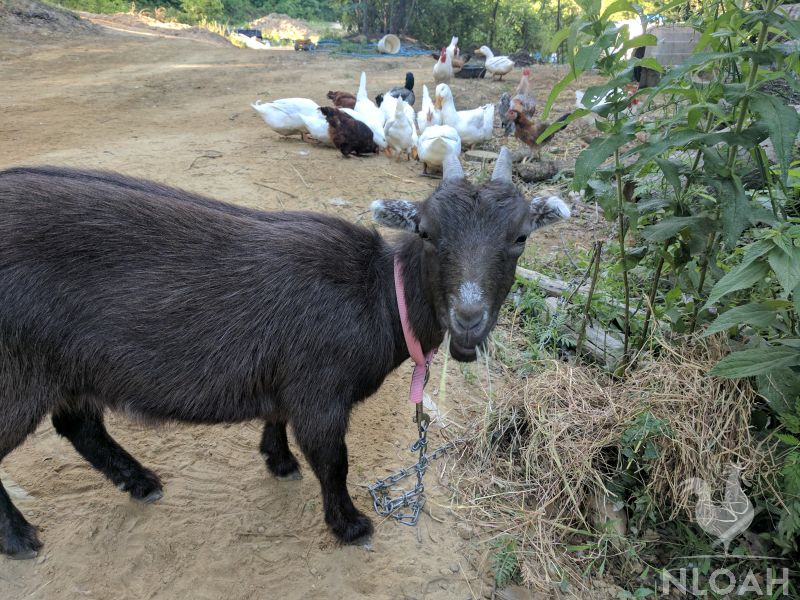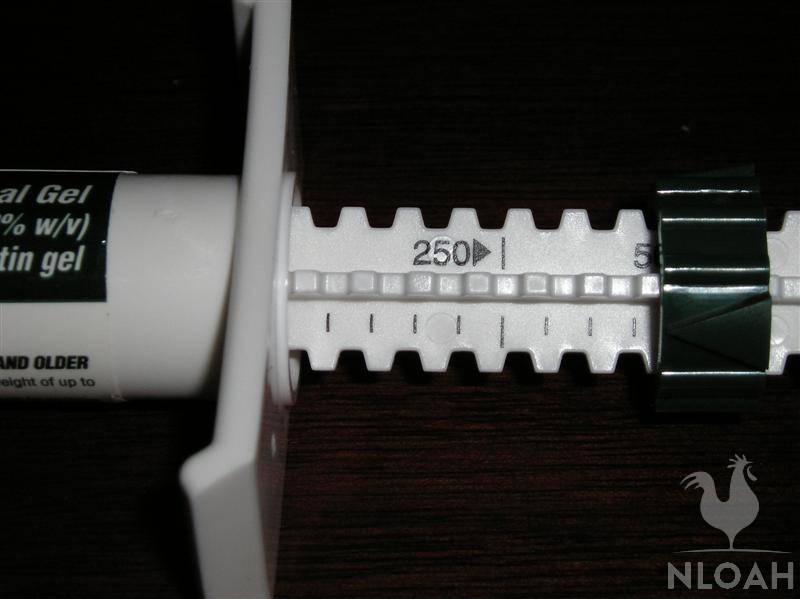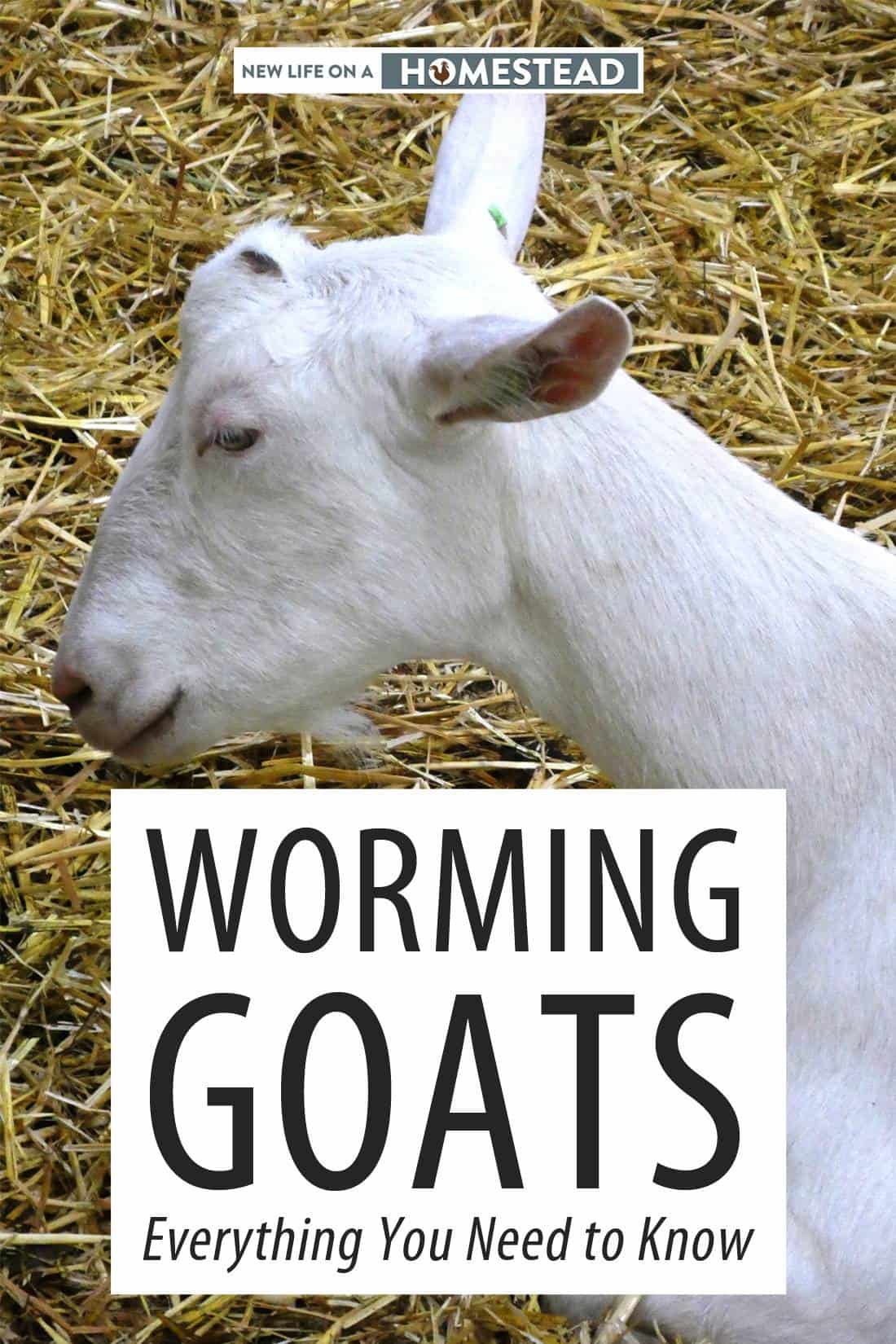I mentioned before that we lost our goat Lucy on Christmas day. We weren’t sure why she died, but now we suspect it was worms. The day after she died I noticed that our other goat, Mocha, had really runny poop.
I called my friend Hope for advice. She said it sounded like she had worms. I admitted that we hadn’t wormed the goats. She said, “Ohhh! Then, yeah, she definitely has worms.”

She told me that goats need to be wormed often. I thought they only needed to be dewormed when there were signs of a problem. She said that if the poop is runny, that’s a bad case. They can drop dead very quickly once they are that bad off. Man, did I feel bad! She said that was probably what got Lucy.
I told her that I didn’t notice any signs of Lucy having any problem before she died. She said that she’d had a few just drop on her like that too, no signs of any problem, they just died.
So, now we know. The need to be wormed.
With that bad experience behind me, I’m here to share with you everything I’ve learned about worming goats – that way, you don’t have to worry about making the same mistakes!
Be Aware of the Most Common Goat Parasites
There are a few types of internal parasites that can wreak havoc among your goats. These include lung worms, stomach worms, and liver flukes.
Lung worms irritate primarily the bronchioles within the lung, causing issues with both mucus and white blood cells. These parasites will cause notable respiratory problems, such as coughing and wheezing.
Stomach worms are bloodsuckers that can rapidly cause your worms to become anemic. A severe stomach worm infestation can also cause problems like weight loss, diarrhea, and colic.
Liver flukes, as the name suggests, burrow into the liver, leading to severe scarring and other damage. Because scar tissue, obviously, is not functional, liver flukes can cause the function of a liver to become severely diminished. Other organs can shut down as a result of severe liver damage, too.
Try FAMACHA Scoring
FAMACHA is a method that has often been used in sheep to detect parasite loads. Sheep are especially vulnerable to parasite infestation and it can be hard to know whether an animal needs to be dewormed until it’s too late.
At the same time, you don’t want to get in the habit of worming constantly, since this is not only time-consuming and expensive but can also lead to the development of resistant parasites that don’t respond to any kind of drug.
FAMACHA lets you warm effectively, but with the least amount of time and effort involved. This method is particularly effective at detecting Haemonchus contortus, a tiny worm that lives in the fourth stomach of the goat and sucks its blood. Since a goat can lose up to a cup of blood per day, with young animals being particularly vulnerable,this parasite can cause anemia and death very quickly.
It reproduces rapidly in the pasture, too, since this particular parasite can lay 5000 eggs in a single day.
FAMACHA scoring was developed in South Africa where worms are particularly problematic. It works by detecting levels of anemia by looking at the pinkness of the color in the inside of the eyelid.
You can look up a FAMACHA chart online which has images of various eyelid colors and their corresponding state of direness in terms of worming. A very pale eyelid indicates an immediate need for worming, while a deep red indicates a perfectly healthy animal.
By using FAMACHA scoring, you can warm only animals that need it most. That way, you won’t have to worry about upsetting the delicate balance and causing resistance.
Don’t Be Afraid of Off- or Extra-Label Use
In 1994, the Animal Medicinal Drug Use Clarification Act created specific guidelines for using drugs extra-label, meaning that it’s okay to use certain drugs in certain animals even when the FDA hasn’t formally approved the drug for that specific species.
Only use an extra-label drug to treat an animal after you’ve chatted with a veterinarian and ensured that there are no other drugs that can be used to treat that parasite infestation. Extra-label use is fine but only if the approved drug has been tried and does not work.
Check for Milk and Meat Withdrawal Periods
Check the label on yoru dewormer before using it to see what the withdrawal periods are for both meat and milk. If you don’t see a withdrawal period, back away – that is a strong indication that the drug should not be used for that animal.
There is often a lack of a recommendation because the drug has not been studied in that animal – but sometimes it’s because the drug stays in the animal’s system so long that there is no practical reason to use it.
There Are Several Types of Dewormers You Can Use
There are a few types of dewormers you can use on your goats, and not a single one is better than the next – it’s all about your specific herd, and what they need.
The first category is white dewormers. These are named as such because they are typically sold as white pastes or liquids. Made out of benzimidazole, they can be either albendazole or fenbendazole.
There are many brand-name drugs that have the same one or two active ingredients, like Panacur and Safe-Guard. Valbazen is another white dewormer you might see.
Disclosure: if you visit an external link in this post and make a purchase, I may earn a commission. Read my full earnings disclosure here.
Technically, the only white dewormer that is approved for use in goats is Safe Guard, but many of these other drugs are frequently used off-label.
It’s important to note that the benzimidazole, or white, dewormers are the only ones effective against tapeworms.
Just a single dose can knock out the tapeworms if you use albendazole, since it’s stronger but fenbendazole can also be used three days in a row. This is helpful to know if you are treating pregnant women, who cannot tolerate albendazole early in pregnancy.
Another category of dewormers is clear dewormers. Also known as macrocyclic lactone dewormers, these come in the form of a clear gel or liquid. Ivermectin and moxidectin fall into this category.

Ivermectin is weaker than moxidectin, and has a few more issues with parasite resistance. Again, these two drugs are not labeled for use in goats, but may be used as a pour-on or orally.
The last category of dewormers is solid dewormers. These aren’t quite as common, usually sold as a bolus, a feed additive, a medicated feed, or a water-soluble powder.
These dewormers are made of imidazothiazole and include names like levamisole and morantel tartrate. The only one approved for use is a feed additive of morantel tartrate.
Levamisole, on the other hand, can be found as a powder or bolus and since it’s used so little in goats, it’s often a good choice when other dewormers are no longer effective. It’s very easy to overdo it on this dewormer, though, and it can cause toxicity.
Know How to Administer a Wormer
If you’re worming your goats with a medicated feed or pour-on, then there’s not much you need to know in terms of technique – you simply give the worm and let it do its job.
However, for other wormers, there are a few tips to follow.
First, hold your goats off feed for at least 12-24 hours. This will let the wormer get in exactly where it needs to go faster and at a higher, more concentrated dose.
If you are drenching your goats with the wormer, you will want to make sure you give it over the tongue instead of in the cheek pouch. A dosing syringe can help. You’ll repeat the dose every 12-24 hours.
How to Tell if Your Wormer is Working
After worming your animals, you need to keep a close eye on them. Use the FAMACHA card to get a good idea and check your animals at least once every three months during cold weather and at least once per month during the hotter periods of the year. Young animals should be checked even more often as they can die quickly from worms.
Don’t Overdo it on the Feed Additives
While there are many different kinds of dewormers that you can use in your animals’ feed, it might not be the best option when it comes to a long term strategy for fighitng off worms. You can use a medicated feed as a dewormer every now and then but don’t rely on it for your regular source of food for your goats.
You May Need to Combine Dewormers
In some cases, particularly when individual dewormers no longer work, you may need to combine dewormers from multiple classes. For instance, you can give a dose of ivermectin followed by a dose of albendazole. Don’ tmix them together but use them in a sequence.
The reason to do this is that the dose of one drug might kill 60% of the worms and the other drug might kill the remaining 40%. Some veterinarians even recommend using dewormers from all three classes at each and every morning to kill out all of the worms.
I’d be hesitant doing this if I were you, though. That’s because using all three dewormers at once increases the likelihood that the parasites will develop a resistance to all of the drugs, leaving you with no options later on.
Watch Goats After Kidding
There are certain times of the year when worms are at higher populations – and when goats are more likely to get infected by parasites. Kidding often encourages a “worm bloom” because a doe’s energy stores and immune systems are depleted after such a stressful period. It’s a good idea to worm each doe after she has kidded (about 24 hours afterward is ideal),
Sheep Dosing
If you’re using a sheep dewormer on your goats, you can usually double the appropriate dosage for a sheep for use in your goats. The only exception to this is levamisole, which should be dosed at 1.5 times what you would give a sheep to avoid toxicity.
Avoid Worms in the Future
Of course, deworming is a necessary step when it comes to keeping a healthy, productive herd of goats. However, there are steps you can take besides deworming to keep your animals healthy.
A healthy goat will be much more adept at succumbing to a parasite infestation. Therefore, it’s important that you select for harder animals in your flock, getting rid of those who tend to succumb to illness more often than not. Resistance can be genetic, so don’t allow those animals with poor resistance to breed!
Keep your pastures aminteind and healthy. Most parasites, including the ones responsible for severe anemia, reproduce rapidly in warm,wet weather, and goats will continue to pick them up as they graze back over areas where other animals have defected.
Rotate pastures as often as possible, ideally giving every pasture a rest period of at least 30 days (the longer, the better). Worm larvae are easily dried out and will stay closer to the ground in dry weather – so if your animals are grazing short pastures in hot, dry weather, they’re going to have higher worm loads.
When the grass is taller, your goats will simply not pick up as many parasites. Rotate pastures and make sure your animals constantly have fresh land to graze.
You might also try multi species grazing, or running other animals with your goats. Although llamas, sheep, and goats share some common sheep parasites, animals like cattle, chickens, and horses do not – and they may actually eat each other’s worms to provide mutual benefit.
Be Vigilant When it Comes to Internal Parasites in Goats
A goat’s poop is a big health indicator. Hope told me that if Mocha’s droppings were not hard pellets, like they should be, within the next two days, that she probably has Coccidiosis, and that she would advise me on how to treat that if it happened to be the case. Fortunately, two days later her droppings were back to normal.
We are to treat her again 6 weeks after her initial dose.
I hate that we didn’t know this sooner. But as Hope said, “Hey, don’t feel bad. You’re learning!” Yeah. We are definitely learning. And in hindsight, I did notice that the goat’s poop was coming out in large clumps, instead of small hard pellets. I thought they were just constipated or something, but now I know that they were sticking together from being moist… a sign of worms. Now I know.
Next time we won’t wait until the poop is runny. By then it may be too late. We’re gonna stay on a strict deworming schedule!
Ultimately, the best tip I can give you when it comes to worming goats is to be as vigilant as possible. There are all kinds of internal parasites that can harm your goats and if you aren’t watchful and attentive to your goats’ deworming needs, they can make your animals extremely sick – or even kill them. Follow these tips for worming goats for a healthier, happier herd!
updated 05/26/2021 by Rebekah Pierce


A city girl learning to homestead on an acre of land in the country. Wife and homeschooling mother of four. Enjoying life, and everything that has to do with self sufficient living.

Don’t be discouraged as new goat farmers, we have all been there. There are some incorrect observations that were made (again, simply from inexperience, we have all been there). Goats don’t drop dead without other “signs” or indicators. Like all of us, you just didn’t know what to look for. If a goat is scouring (has the runs), it is most likely anemic (among other things) anemia will always cause weight loss which was not obvious to me when I first started farming meat goats. Now, I can simply look a a goats coat and tell if she needs deworming or not, or at least tell if i need to go hands on and just rub down her back. If I can feel her spine and ribs, she is anemic. If it’s smooth and meaty, she’s good to go. This article has a lot of good info but the constant back and forth on terminology like “worming” and “deworming” can be confusing for folks that are new to this. I know there are a lot of folks that love natural solutions for medications and dewormers in particular but please post some links of any study or videos of them actually working. Tip; there aren’t any. I wish there were, but that is the reality we’re at today. It really bothers me watching folks new to goat farming loosing animals while they feel good thinking they’re being all natural in their preventative measures.
Hello, Does have lemon grass could be ginger? Lemon grass is hard to get hold of ginger is not so much, does matter what kind ginger: raw, power or paste?
I think Of giving my goats natural de-wormer that easier administer that would be easier mask like with dosage of peanut butter or with yogurt that way they ingest without issue.
Goats tend dislike seeing syringes and know someone planning give them medicine and fight the entire time.
It’s also really important to begin looking at holistic treatment especially if you are currently worming with meds so regularly. There are many treatments, especially preventative, that can aid in balancing the overall health and heartiness of goats. Molly’s Herbals at Fiasco Farms website has many valuable, organic and natural solutions. Organic coconut oil actually has properties in it that cause coccidia to blow up. I made a decoction that include typical marigold (African), activated charcoal (found at many health food stores), lemon grass, and mixed with 1 tablespoon of organic unprocessed coconut oil. My goat went from diarrhea to healthy pellets within hours. Just a thought…
We lost a 3 month old wether this summer to coccidia. We had only had our goats for 3 weeks at that time and they were our first foray into goats. Since then, I have learned lots about worming goats and coccidia, in particular. We worm the goats once every 3 months. We haven’t had any problems since, thank goodness!
Hi ~ Sorry about losing Lucy, especially on Christmas. Love the picture of her. That must have been awful…..I really enjoy your blog. Thanks for sharing your life and experiences with all of us….
Also, those Storey’s Guide To… are great! I don’t have the one on goats but they have one… I have the one on chickens and the one on rabbits. I don’t have either yet (plan to get chickens soon if I can figure out a way to keep the animals from killing them!) but I study those books all the time. I didn’t have a lot of money to spend so I asked around and read a lot online about the best small livestock books and these were the most highly recommended. Might want to check it out!
PS. I have the Carla Emery one too. I LOOOVVVEEE that book. Such a wonderful resource for my book shelf!
Kendra,
You should read “The Encyclopedia of Country Living” by Carla Emery. You can get it on Amazon for $18. It’s expensive but it’s a large book and over an inch thick. It tells how to raise different livestock (medicines needed, how to give,and how to butcher)and includes photos. It’s a very informative book for someone who wants to become self-sufficient. It also includes gardening, canning, and many other useful information.
Alana-
Hi! Actually, I do own that book. Guess I need to refresh on the livestock portion, huh? Thanks for the suggestion though!